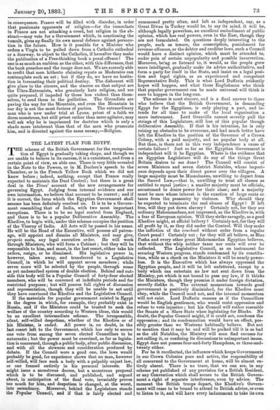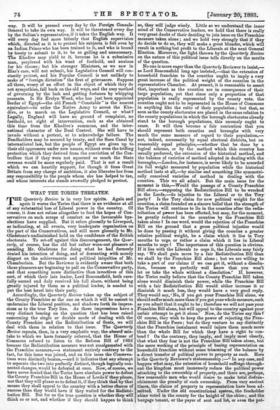THE LATEST PLAN FOR EGYPT.
THE scheme of the British Government for the reorganisa- tion of Egypt is gradually taking shape, and though we are unable to believe in its success, it is a consistent, and from a certain point of view, an able one. There is very little revealed in the Note to the Powers, or in M. Duclerc's speech to the Chamber, or in the French Yellow Book which we did not know before ; indeed, nothing, except that France really expected to maintain the Dual Control ; but there is a great deal in the Times' account of the new arrangements for governing Egypt. Judging from internal evidence and our own information, we believe that account to be correct ; and if it is correct, the form which the Egyptian Government shall assume has been definitely resolved on. It is to be a Govern- ment resembling that of India, with two most important exceptions. There is to be no legal control from England, and there is to be a popular Deliberative Assembly. The Khedive, to begin with, under this scheme occupies the position of the Viceroy of India. All Acts will be passed in his name. He will be the Head of the Executive, will possess all patron- age, will appoint and dismiss all Ministers, and may give, proprio mote, any legal executive order. He will work through Ministers, who, will form a Cabinet ; but they will be responsible to him, and must, in the last resort, either take his orders, resign, or be dismissed. His legislative power is, however, taken away, and transferred to a Legislative Council, in. which he will appoint seven members ; while seven more will be selected by the people, through some as yet undescribed system of double election. Behind and out- side this body will, be a Popular Council of forty-four elected members, who will be convened at indefinite periods and for restricted purposes ; but will possess full rights of discussion and representation, though they will be unable to act until they have convinced the Khedive and the Legislative Council.
If the materials for popular government existed in Egypt in the degree in which, for example, they probably exist in Russia, and if the Ministers could be trusted to seek the welfare of the country according to Western ideas, this would be an excellent intermediate scheme. The irresponsible, silent, sell-willed despotism, whether of the Khedive or of his Minister, is ended. All power is, no doubt, in the last resort left to the Government, which has only to secure one vote from among the seven elected Councillors to be autocratic ; but the power must be exercised, as far as legisla- tion is concerned, through a public body, after public discussion, and with all the slowness and consideration produced by debate. If the Council were a good one, the laws would probably be good, for experience shows that no man, however self-willed, will face such a body with a palpably unjust law, or one framed entirely in his personal interests. He might issue a monstrous decree, but a monstrous proposal which is to be discussed, and published, and argued about, in anticipation of the final vote, invariably proves too much for him, and despotism is changed, at the worst, into ascendancy. Moreover, behind the Legislature stands the Popular Council, and if that is fairly elected and summoned pretty often, and left as independent, say, as a Great Divan in Turkey would be, to say its mind, it will be, although legally powerless, an excellent embodiment of public opinion, which has real powers, even in the East, though they are not formulated. On questions deeply interesting to the people, such as tenure, the conscription, punishment for revenue offences, or the debtor and creditor laws, such a Council would have a distinct opinion, which must be attended to, under pain of certain unpopularity and possible insurrection. Moreover, being so listened to, it would, as the people grew more intelligent, gradually make its advice authoritatiVe, and form a party for itself in the State, and insist on a legal posi- tion and legal rights, as an experienced and competent Representative Body. This is what Lord Dufferin evidently hopes will happen, and what those Englishmen who think that popular government can be made universal will think is sure to happen in the long-run.
The scheme is most sincere, and is a final answer to those who believe that the British Government, in demanding Egypt for the Egyptians, is only playing a part, and in- tends for all time to make of the local organisation a mere instrument. Lord Granville cannot secretly pull the strings of this Legislature, still less of this popular though deliberative Assembly. If that is his intention, he is only raising up obstacles to be overcome, and had much better have left the Khedive in the position of the Governor of a Crown_ Colony, with a paid majority, and no popular body at all. But then, is there not in this very independence a cause of- certain failure? Just so far as the Egyptian Government is independent will it be Egyptian. Where is the evidence that an Egyptian Legislature will do any of the things Great Britain desires to see done / The Council will consist of seven Ministers and seven district Notables, whose import- ance depends upon their direct power over the villagers. A large majority must be Mussulmans, unwilling to depart from the Sacred Law,—that is, unwilling to treat all classes as entitled to equal justice ; a smaller majority must be officials, accustomed to desire power for their class ; and a majority must be men whose interest is the exaction of large rents on.
taxes from the peasantry by violence. Why should they be expected to terminate the real abuses of Egypt? If left free, will they put down slavery ? Certainly not, for they are ordinary Mahommedans, not impressed, as the Khedive is, with a fear of European opinion. Will they strike savagely, as a good Khedive might, at official bribery / Certainly not, for they will all profit by it, as they did under the Control. Will they make the infliction of the courbash without order from a regular Court penal ? Certainly not ' • for they will all believe, as Rian Pasha and every other great Mahommedan Egyptian believes, that without the whip neither taxes nor rents will ever collected. The Legislative Council, as an instrument for securing Western progress, stands condemned by its constitu- tion, while as a check on the Ministers it will be nearly power- less. It is the Executive which has always oppressed the Egyptian people, and it will be left unfettered, except by a body which can entertain no law not sent down from the Ministry, yet which is not bound to pass any law, if it thinks the Ministers, though they promise it under foreign dictation, secretly dislike it. The external momentum towards good' government is positively diminished, for the Khedive must obey, while the Council need not, and the internal momentum will not exist. Lord Dufferin reasons as if the Councillors would be English gentlemen, who would resist oppression and refuse to vote injustice ; but his Council will rather resemble the Senate of a Slave State when legislating for Blacks. No doubt, the Popular Council might, if it could act, condemn the oppression ; and its condemnation would have an effect, pos- sibly greater than we Westerns habitually believe. But not to mention that it may be and will be packed till it is as bad as the old Notables, the Ministry will soon find excuses for not calling it, or confining its discussions to unimportant issues. Egypt does not possess four-and-forty Hampdens, or three-and- twenty either.
For be it recollected, the influence which keeps Governments in our Crown Colonies pure and active, the responsibility of all concerned to the Government at home, will be almost en- tirely absent. There is no trace, that we can see, in any- scheme yet published of any provision for a, British nesident, or any Convention which shall secure to the British Govern- ment a right of separate interference, even by advice. The moment the British troops depart, the Khedive's Govern- ment will cease to be bound to attend to British advice, or even to listen to it, and will have every inducement to take its own. way. It will be pressed every day by the Foreign Consuls- General to take its own way. It will be threatened every day by the Sultan's representative, if it takes the English way. It will every day feel more bitterly that English supervision which, directed as it is to protect his subjects, is felt even by an Indian Prince who has been trained to it, and who is bound by treaty to submit to it, to be so galling and unnecessary. The Khedive may yield to it, because he is a submissive man, perplexed with his want of foothold, and anxious for his throne ; but his stronger Ministers, as we saw in Bias's case, will not submit, his Legislative Council will con- stantly protest, and his Popular Council is not unlikely to make of " foreign dictation" the first of grievances. Suppose all three, weary of an effort in the object of which they do not sympathise, fall back on the old ways, and the easy method of governing by the lash and getting fortunes by whipping peasants. Is Sir Evelyn Wood, who has just been appointed Border of Egypt—the old French " Constable'' is the nearest equivalent—to order the Native Army to arrest the Khe- dive, or to march on the Legislative Council, or what ? Legally, England will have no ground of complaint, no foothold, no right of intervention, such as she obtained this time from the Khedive's summons, and the inter- national character of the Dual Control. She will have to invade without a pretext, or to acknowledge failure. The Bondholders may be secured by treaty, and the Suez Canal by international law, but the people of Egypt are given up to their old oppressors under new names, without even the trifling protection which they derived from the conviction of the Con- trollers that if they were not squeezed so much the State revenue would be more regularly paid. That is not a result which we can heartily support, for though it frees Great Britain from any charge of ambition, it also liberates her from any responsibility to the people whom she has helped to tax, -and whose interests she stands avowedly pledged to protect.



































 Previous page
Previous page